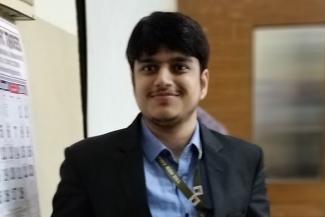
Zoyeb Zia, now an assistant professor of Zoology, has a rare condition called Ataxia. Zoyeb talks here about how he coped with the condition after he was diagnosed with Ataxia at the age of 16.
Ataxia is a neurological disorder, which means ‘without order’ in Greek, affects a person’s balance, and it causes poor coordination of the limbs, poor gait movement, slurs the speech and affects the eye movement etc. Ataxia is classified as a rare disease.There are many variants of this disorder, and it is estimated as 1-10 in 150000 persons, covering all variants.
How did you handle the changes that started happening in your body after leading a completely normal life?
At first, I handled them negatively, thinking of giving up, not being able to accept my situation etc. I think only after accepting my situation, and talking about it freely I began to have a positive view of things around me. No matter what the problem is, look for a solution and keep moving ahead towards your goal and you will achieve it. I found that when you start voicing out your goals and the problems you may be facing in achieving them, solutions will start coming your way.
How did you try to retain your normalcy?
After the initial phase of negativity, the acceptance, motivation, support, encouragement of people around me, especially my family helped me gain self-confidence which helped me get back to normalcy.
Was it difficult to continue with your studies?
At times I would face accessibility issues which were tough. Being in India, the issues are a given. Even small issues like finding an auto every day to go to college, finding a friend to take me from class to class, moving up and down floors to attend classes became a big hurdle for me. But apart from this there was not much of a difficulty in continuing with my studies.
How did you decide to go for a teaching profession?
At one point a few people started telling me I had good skills of explaining things to people, and this acted as reinforcement to the fact. I had also won a few debate and paper presentation competitions at the college and intercollege levels which proved to be encouraging towards this career.
What are the challenges in your professional life?
Lack of accessibility at the ground level I feel is the most challenging part.
How has your family supported you?
My family has always given me the power to make my own decisions and stood by me. But more importantly, they have made sure that I have the tools to make the right decision – ensuring I had the right education, the right contacts etc.
They always made sure I did not feel excluded from anything – family functions, outings etc. They have always made sure that I not only feel included but that I also enjoy to the best extent possible.
They have never treated me differently.
Did you see a counselor for support? Were you offered counseling by doctor?
Yes I did see a psychological counselor for some time. Then I decided why go to a psychologist, when I can become one. I did a correspondence degree – BSc Psychology. And I would love to do a Masters too if possible. Jokes aside, I believe getting a bit of counseling would help.
Read More What is Counselling? Is It For Me?
What was the hardest part of the treatment? And what kept you going?
The fact that there is no single proven treatment yet is disheartening. But a hope for a confirmed diagnosis and a cure keeps me going, along with the belief that my condition will not interfere with my goal.






